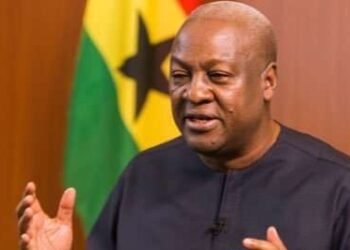The December 2024 general elections in Ghana are shaping up to be a pivotal contest, particularly in the five Northern regions.
Historically, the National Democratic Congress (NDC) has dominated these regions, securing the majority of votes in previous elections.
However, the emergence of Vice President Dr. Mahamudu Bawumia as the New Patriotic Party Vice Presidential Candidate and subsequently flagbearer has significantly altered the political dynamics, leading to increased electoral gains for the NPP in these regions.
In the 2020 general elections, the NDC won four out of the five Northern regions, maintaining its traditional stronghold.
Despite this, the NPP saw an appreciable increase in voter performance. The 2024 elections present an intriguing narrative, as both presidential candidates hail from the Northern part of Ghana.
Former President John Dramani Mahama, the NDC flagbearer, is from the Savannah Region, while Vice President Dr. Mahamudu Bawumia, the NPP flagbearer, is from the North East Region.
This shared regional origin makes the Northern regions a critical battleground in the upcoming elections.
Political analysts and pollsters have highlighted the significance of the Northern regions in the 2024 elections. The NPP, buoyed by Dr. Bawumia’s candidacy, is confident in its prospects.
Salam Mustapha, the NPP’s National Youth Organizer, has predicted that the party is on track to win 30 out of the 57 seats in the Northern regions, marking a historic shift in political dominance. Mustapha has even declared the presidential election a “forgone conclusion” in favor of the NPP.
In contrast, the NDC has dismissed Mustapha’s assertions, expressing confidence in their ability to strengthen their electoral hold and win the December 7 polls. Former President Mahama launched a campaign tour in these regions, immediately after the Vice President’s extensive tour of the regions, underscoring both candidates’ commitment to securing victory.
In a detailed interview with Vaultz News, Dr. Abdul Hakim, a Political Science Lecturer at the University of Education, Winneba, dissected the electoral dynamics at play in the five Northern regions of Ghana as the country approaches the December 2024 elections.
Dr. Hakim provided an insightful analysis of the personalities, track records, and strategies of former President John Dramani Mahama and Vice President Dr. Mahamudu Bawumia, and how these factors influence voter perceptions in these critical regions.
Dr. Hakim began by highlighting the historical context that cements the Northern regions as strongholds of the National Democratic Congress (NDC).
He noted that during the Fourth Republic transition in 1992, the NDC strategically targeted these regions to counter the dominance of the Ashanti region, which is a stronghold of the New Patriotic Party (NPP).
“The Northern regions are technically, not by accident designed to provide massive electoral support for the NDC during the fourth republican transition in 1992. So, you know, a lot of development happened in the 1980s and to early 1990s in the Northern region, the road network from Accra to Bolgatanga was done by the PND/NDC.
“That was one of the reasons that won the hearts and minds of the voters of these regions, including several other developments in these regions such as the Tamale township roads were done under the PNDC/NDC era”.
Dr Abdul Hakim, Political Science Lecturer at the University of Education Winneba
This historical allegiance, he noted was further strengthened by the inclusion of several Northern elites within the NDC, such as Mahama Iddrisu, the current Chairman of the NDC Council of Elders, and Alhaji Hudu Yahaya, etc., which contrasted with the NPP’s relative lack of Northern representation.

Impact of Dr. Bawumia’s Emergence
However, Dr. Hakim acknowledged that the emergence of Dr. Bawumia has significantly shifted the political landscape.
This decline according to him began around the 2012 elections and has continued through subsequent elections.
He pointed out that Dr. Bawumia’s energetic campaign and ability to counter NDC dominance in his own constituency have made the NPP more competitive in these regions in recent times, attributing it to the NDC’s relaxed approach to sustaining its dominance.
“The emergence of Dr Bawumia has led to a decline in the support even in terms of the seats that the NDC garnered in those areas. And that is because of the complacency of the NDC, especially after the 2008 elections. In fact, the decline started in 2012, 2016, and 2020. And then, to where we are now”.
Dr Abdul Hakim, Political Science Lecturer at the University of Education Winneba
Ethnic and Tribal Politics
Furthermore, Dr. Hakim emphasized the importance of tribal politics in the Northern regions, arguing that identity issues, especially tribal ones, play a crucial role in Ghana’s politics.
According to him, Dr. Bawumia has capitalized on this dynamic, leveraging tribal connections to bolster support.
Conversely, Dr Hakim indicated that former President Mahama has failed to effectively play the “tribal game,” leading to a perceived complacency within the NDC.
However, Dr. Hakim noted that Mr Mahama and his handlers are now more proactive in addressing this issue ahead of the 2024 elections.
Religious Affiliation and Economic Challenges
Interestingly, Dr. Hakim dismissed the impact of religious affiliation on voter preferences. Despite Mahama being a Christian and Dr. Bawumia a Muslim, he argued that religion would have “zero impact” on the elections.
He cited former President John Dramani Mahama’s upbringing in a Muslim household and his close ties to the Muslim community as factors that neutralize any potential religious bias.
Dr. Hakim highlighted the pressing economic challenges facing the Northern regions as a critical factor that could influence voter behavior.
“The economic challenges we face, especially in the poorest regions of the country, will be a significant determinant,” he stated.
He stated that the NPP’s strategy of appointing ministers from the Northern regions to direct resources there is a tactical move to address these challenges and gain favor with voters.
However, Dr. Hakim warned that this could be seen as a temporary solution and urged the NDC to effectively communicate this to the electorate.
Campaign Strategies and Key Issues
Examining the campaign strategies of the two candidates, Dr. Hakim noted that both Mahama and Dr. Bawumia are intensifying their efforts in their respective strongholds.
“Mahama is working hard to counter the NPP’s gains, particularly in the Northeast region,” he said, adding that both candidates are leveraging local support teams to reverse declining fortunes and consolidate their bases.
Moreover, Dr. Hakim identified agriculture as the most critical issue for voters in the Northern regions, asserting that “Agriculture is more important than even gold or oil production for these regions”.
He pointed out that politicians have long recognized this, yet substantive development in modern agriculture remains elusive, criticizing the reliance on propaganda and short-term solutions.
The Political Scientist called for significant investments in agriculture, infrastructure, health, and education to truly address the needs of the Northern electorates.
Influence of Local Leaders
Responding to how significant the endorsements and support of local leaders and influencers in the Northern regions are for the electoral success of the presidential candidates, Dr Hakim pointed out that the endorsement and support of local leaders and influencers can be significant but are not always straightforward.
“There is often a split in traditional leadership, with some leaders supporting one party and others opposing it,” Dr. Hakim explained, arguing that this division can dilute the impact of endorsements and highlights the complex interplay of intra-ethnic and historical factional issues.
As Ghana approaches the December 2024 elections, the Northern regions will be a battleground for both the NDC and NPP.
Former President John Mahama and Vice President Dr. Mahamudu Bawumia must therefore navigate complex tribal dynamics, address economic challenges, and effectively communicate their policies to secure votes.
Dr. Abdul Hakim’s analysis underscores the importance of strategic engagement and the need for both candidates to rise above temporary fixes and focus on sustainable development to win the hearts and minds of Northern voters.
READ ALSO: Lil Win Apologises To Martha Ankomah For Defamatory Remarks




















